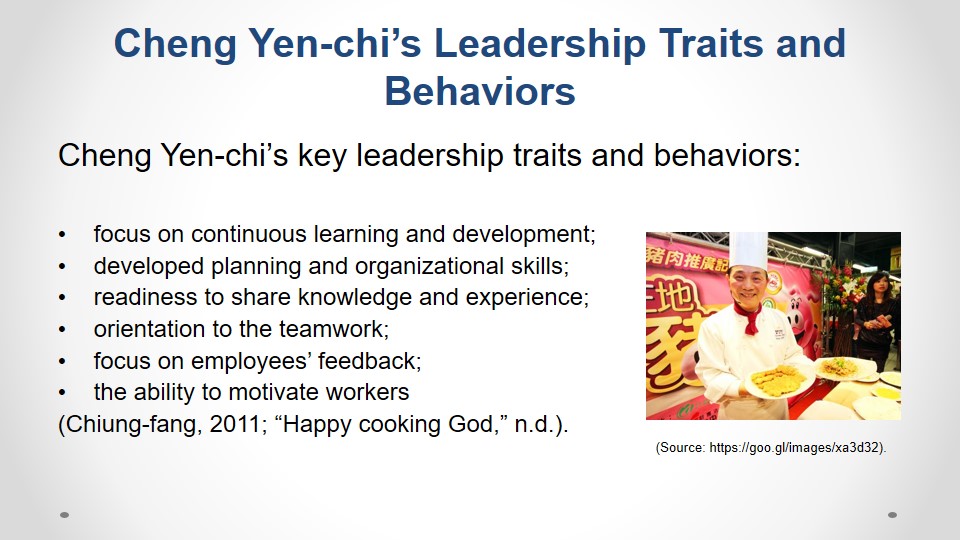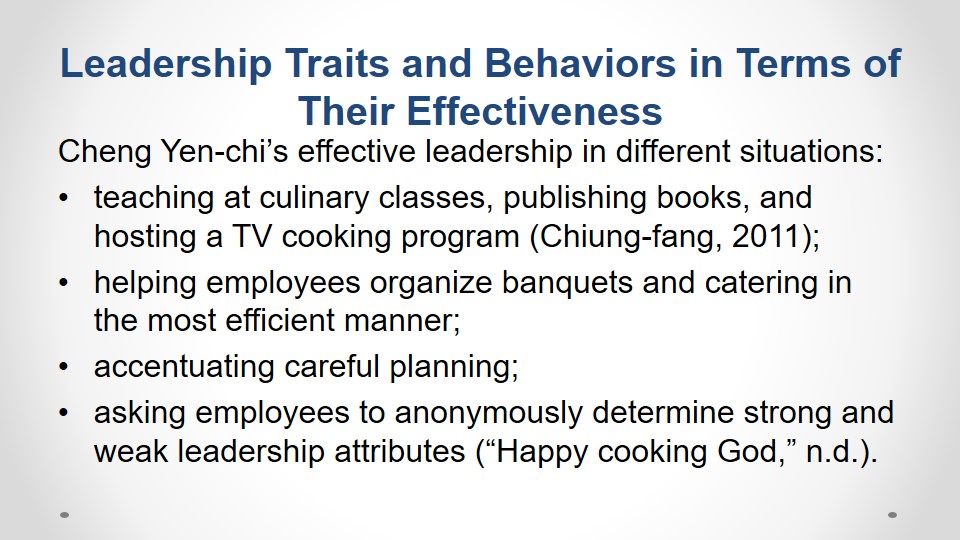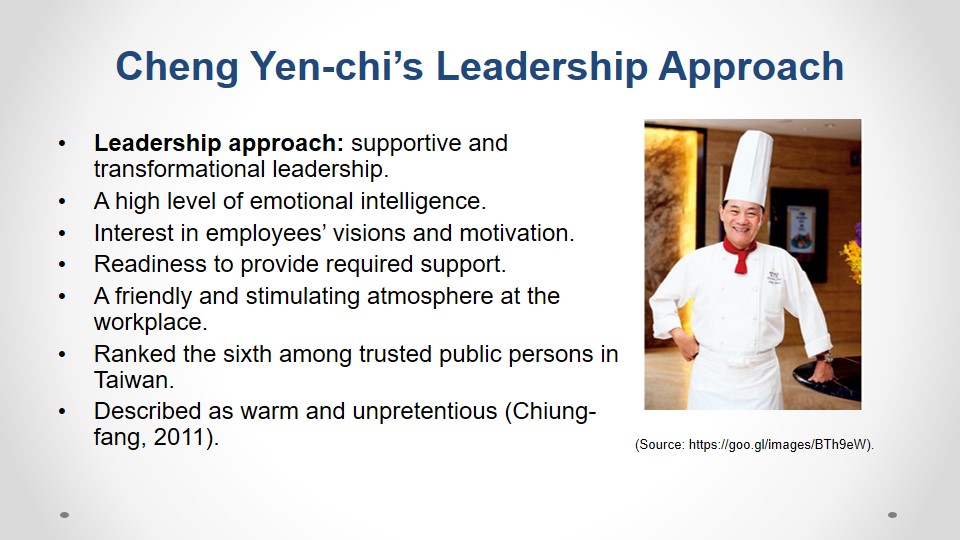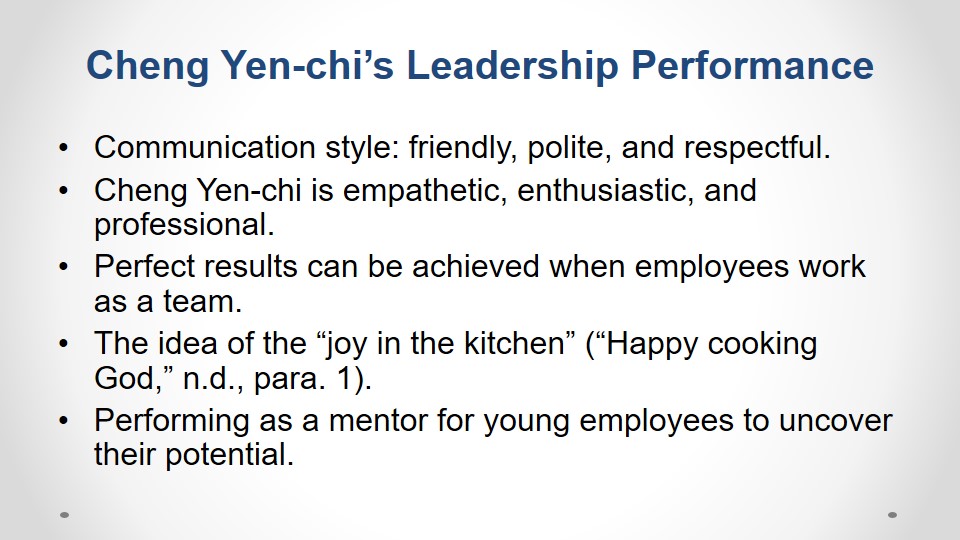Cheng Yen-chi’s Leadership Traits and Behaviors
Cheng Yen-chi’s key leadership traits and behaviors:
- focus on continuous learning and development;
- developed planning and organizational skills;
- readiness to share knowledge and experience;
- orientation to the teamwork;
- focus on employees’ feedback;
- the ability to motivate workers (Chiung-fang, 2011; “Happy cooking God,” n.d.).
The key leadership traits and behaviors of Cheng Yen-chi known as Master A-chi or Chef Ah-Chi include the following ones:
- the focus on continuous learning and development;
- developed planning and organizational skills;
- the readiness to share his knowledge and experience;
- the orientation to the teamwork.
In addition, Cheng Yen-chi is focused on his employees’ feedback regarding his leadership style, and he uses this information in order to improve his performance and motivate workers while creating a positive working atmosphere for them (Chiung-fang, 2011; “Happy cooking God,” n.d.). Thus, as a well-known leader, Cheng Yen-chi develops himself and contributes to the development of his subordinates, accepts the importance of a team, and pays attention to employees’ attitudes and ideas.

Leadership Traits and Behaviors in Terms of Their Effectiveness
Cheng Yen-chi’s effective leadership in different situations:
- teaching at culinary classes, publishing books, and hosting a TV cooking program (Chiung-fang, 2011);
- helping employees organize banquets and catering in the most efficient manner;
- accentuating careful planning;
- asking employees to anonymously determine strong and weak leadership attributes (“Happy cooking God,” n.d.).
The effectiveness of Cheng Yen-chi’s leadership traits and behaviors can be assessed with reference to the situations he typically addresses. Cheng Yen-chi develops his skills and shares knowledge while teaching at culinary classes, publishing books, and hosting a TV cooking program (Chiung-fang, 2011). He also teaches employees how to organize banquets and catering in the most efficient manner referring to the necessity of careful planning. There is also a practice when Cheng Yen-chi asks his employees to anonymously determine strong and weak qualities associated with his leadership style with the help of questionnaires (“Happy cooking God,” n.d.). These methods can be viewed as effective.

Cheng Yen-chi’s Leadership Approach
- Leadership approach: supportive and transformational leadership.
- A high level of emotional intelligence.
- Interest in employees’ visions and motivation.
- Readiness to provide required support.
- A friendly and stimulating atmosphere at the workplace.
- Ranked the sixth among trusted public persons in Taiwan.
- Described as warm and unpretentious (Chiung-fang, 2011).
Cheng Yen-chi’s overall leadership approach can be associated with supportive and transformational leadership styles. This leader demonstrates a high level of emotional intelligence, he is interested in discussing employees’ visions and motivation, and he is ready to provide required support. The atmosphere at the workplace is friendly and stimulating for further development and growth. As a result, Cheng Yen-chi is ranked the sixth among public persons who are trusted in Taiwan, and he is described as warm and unpretentious (Chiung-fang, 2011).

Cheng Yen-chi’s Leadership Performance
- Communication style: friendly, polite, and respectful.
- Cheng Yen-chi is empathetic, enthusiastic, and professional.
- Perfect results can be achieved when employees work as a team.
- The idea of the “joy in the kitchen” (“Happy cooking God,” n.d., para. 1).
- Performing as a mentor for young employees to uncover their potential.
Cheng Yen-chi’s performance as a leader is associated with his communication style, mentoring activities, and the focus on promoting teamwork. Cheng Yen-chi’s communication style is friendly, polite, and respectful. He is empathetic, enthusiastic, and professional in his activities. Cheng Yen-chi believes that perfect results can be achieved only when employees work as a team, and he develops the idea of the “joy in the kitchen” (“Happy cooking God,” n.d., para. 1). The focus is on performing as a mentor for young employees who want to learn to uncover their potential.

References
Chiung-fang, C. (2011). Great chef, great person: Cheng Yen-chi. Taiwan Panorama. Web.
Happy cooking God – Cheng Yen-chi. (n.d.). Web.